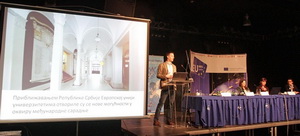 Improving the mobility of students increases the level of educational. However, universities in Serbia still face challenges in this field, as the participants of the conference “Experiences and Perspective in Organizing Credit Mobility” assessed. The participants of the conference organized by the EU Info Centre stated that some of the key challenges are the need to inform students on the possibility of exchange and the provision of support to foreign students.
Improving the mobility of students increases the level of educational. However, universities in Serbia still face challenges in this field, as the participants of the conference “Experiences and Perspective in Organizing Credit Mobility” assessed. The participants of the conference organized by the EU Info Centre stated that some of the key challenges are the need to inform students on the possibility of exchange and the provision of support to foreign students.
The manager of the Tempus-Erasmus+ Foundation Marija Filipović – Ožegović said the foundation advocates mobility as an opportunity for students to spend part of their studies abroad.
The European Union earmarked approximately EUR 20 million for credit mobility projects in higher education for Western Balkans countries through the new Erasmus+ programme. It provides much greater flexibility in cooperation compared to the earlier Erasmus Mundus programme, because every faculty, chair or institute may sign contracts on student and teacher exchange through universities and higher education institutions. Estimates are that exchanges will double, making it very important for higher education institutions to be ready for these challenges, said Filipović – Ožegović.
The deputy minister of education Zorana Lužanin assessed that student mobility is one of the issues where the academic community in Serbia didn’t even attain a passing grade, despite mobility being important as a sure way of raising the level of education. We will pay the price for our lack of a serious approach to mobility in five or ten years, when universities across the European Union open up to students from Serbia, she said.
Source: euinfo.rs
 Government of the Republic of Serbia
Government of the Republic of Serbia















 pdf [271 KB]
pdf [271 KB]
Leave a Comment